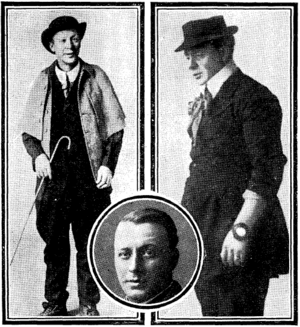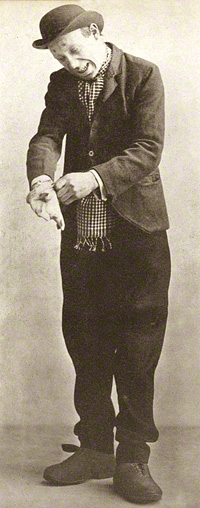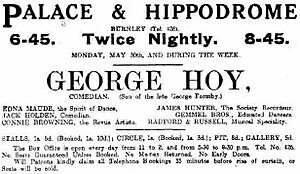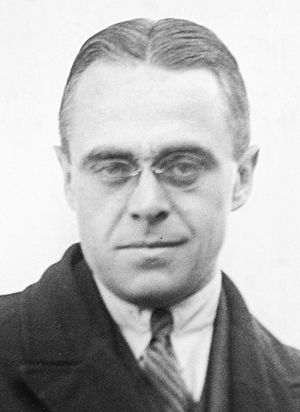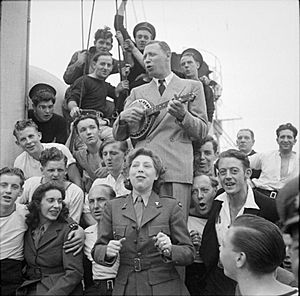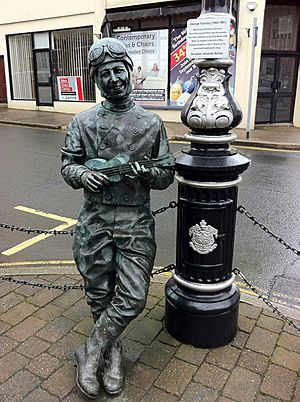George Formby facts for kids
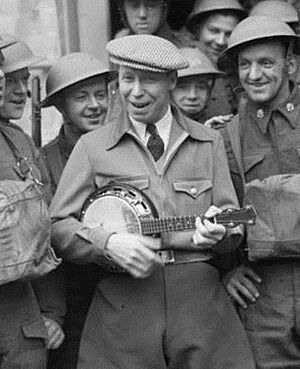
George Formby (born George Hoy Booth; 26 May 1904 – 6 March 1961) was a famous English actor, singer, and comedian. He became known around the world through his films in the 1930s and 1940s. On stage, in movies, and on records, he sang funny, light-hearted songs. He usually played the ukulele or banjolele. George Formby became the highest-paid entertainer in the UK.
Born in Wigan, Lancashire, he was the son of George Formby Sr, who was also a famous performer. George Jr. later took his father's stage name. After working as a stable boy and jockey, Formby started performing in music halls after his father died in 1921. At first, he copied his father's act, including the same songs and jokes.
In 1923, he made two big changes. He bought a ukulele and married Beryl Ingham, who was also a performer. Beryl became his manager and helped change his act. She made sure he dressed formally on stage and added the ukulele to his shows. He started recording songs in 1926. From 1934, he began working more in films. By the late 1930s and 1940s, he was a major star. He was Britain's most popular entertainer during those years. In his films, Formby often played innocent characters from Lancashire. These characters would usually win against bad guys and get the girl.
During the Second World War, Formby worked a lot for ENSA (Entertainments National Service Association). He entertained both civilians and soldiers. By 1946, it was thought he had performed for three million service members. After the war, his career slowed down. However, he still toured countries in the Commonwealth of Nations and appeared in variety shows and pantomimes. His last TV appearance was in December 1960. This was two weeks before Beryl died. He surprised many by announcing his engagement to a school teacher, Pat Howson, seven weeks after Beryl's funeral. But he died in Preston three weeks later, at age 56. He was buried in Warrington next to his father.
Many people saw Formby as a symbol of Lancashire and the working class. He was considered Britain's first truly home-grown film comedian. He inspired later comedians like Charlie Drake and Norman Wisdom. He also influenced musicians like the Beatles, who mentioned him in their music. Since his death, five books have been written about Formby. There have also been two TV specials and two public statues.
Biography
Early Life and Jockey Days: 1904–1921
George Formby was born George Hoy Booth in Wigan, Lancashire, on 26 May 1904. He was the oldest of seven children born to James Lawler Booth and Eliza Hoy. His father was a successful music hall comedian and singer. He performed under the name George Formby. Formby Sr had chest problems, which he sometimes used as part of his jokes. One of his main characters was John Willie, a typical Lancashire boy. Formby Sr was very popular.
George Formby Jr. was born blind, but his sight was restored when he was a few months old. He didn't do well in school and left at age seven. He was sent to work as a stable boy, first in Wiltshire, then in Middleham, Yorkshire. His father didn't want him to become a performer. He said, "one fool in the family is enough." After a year, George became an apprentice jockey in Epsom. He raced professionally at age 10, weighing very little.
In 1915, Formby Sr allowed his son to appear in a film called By the Shortest of Heads. George played a stable boy who outsmarted villains and won a horse race. This film is now lost. Later in 1915, with English racing stopped due to the First World War, Formby moved to Ireland. He continued as a jockey there until November 1918. He then returned to England and raced for Lord Derby. Formby continued as a jockey until 1921, but he never won a race.
Starting a Stage Career: 1921–1934
On 8 February 1921, Formby Sr died at age 45 from his chest condition. After the funeral, George's mother, Eliza, took him to London. They visited the Victoria Palace Theatre, where his father had been very successful. They saw a comedian named Tommy Dixon performing a copy of Formby Sr's act. Dixon called himself "The New George Formby," which upset Eliza and George. This made George decide to follow in his father's footsteps. He had never seen his father perform live, so he learned his songs from records. He learned the rest of the act and jokes from his mother.
On 21 March 1921, Formby had his first professional show in Earlestown, Lancashire. He was paid £5 a week. He was billed as George Hoy, using his mother's maiden name. He didn't want the Formby name to appear in small print. His father's name was used in ads, describing George Hoy as "Comedian. (son of George Formby)." He later performed for the Moss Empires chain of theatres. His first night was not successful. He toured Northern England, but audiences didn't like him much. He was often booed and had periods of unemployment. For two years, Formby was a support act, poorly paid, but his mother helped him financially.
In 1923, Formby started playing the ukulele. He added it to his act during a show in Barnsley. When his songs, still his father's material, were well received, he changed his stage name to George Formby. He also stopped using the John Willie character. Another important event was his show in Castleford, West Yorkshire. There, he met Beryl Ingham, a champion clogdancer and actress. Beryl didn't think much of Formby's act at first. George and Beryl started a relationship and married on 13 September 1924 in Wigan.
Beryl became George's manager. She changed his songs and jokes. She taught him how to use his hands and how to connect with the audience. She also convinced him to wear a black tie on stage and to take ukulele lessons. By June 1926, he was good enough to get a record deal. He recorded six of his father's songs for the Edison Bell/Winner label. Formby toured for the next few years, mostly in the north, and made his official London debut. In 1932, Formby signed a three-year deal with Decca Records. One of his songs, "Chinese Laundry Blues," became a classic. Over his career, Formby recorded over 200 songs. About 90 of these were written by Fred Cliffe and Harry Gifford. In 1932, Formby appeared in his first pantomime, Babes in the Wood, in Bolton. He then toured with the George Formby Road Show. Beryl was the host of the show.
Rising Film Star: 1934–1940
With Formby's stage success, Beryl decided he should try films. In 1934, she spoke to producer Basil Dean of Associated Talking Pictures (ATP). She also met with Irving Asher of Warner Bros. in the UK, who didn't think Formby was suitable for films. Three weeks later, John E. Blakeley offered Formby a one-film deal.
The film, Boots! Boots!, was made on a small budget in London. Formby played the John Willie character, and Beryl also appeared. They were paid £100 for two weeks' work. The film had a very simple plot. Critics didn't like it, but many people watched it. Formby then made Off the Dole in 1935 for Blakeley's company, Mancunian Films. This film also cost little to make but earned a lot of money. Like the first film, it was a revue format, and Formby again played John Willie with Beryl. These two films show Formby's early work before he became a big film star.
The success of these films led Dean to offer Formby a seven-year contract with ATP. This resulted in 11 films. The first film from this deal was No Limit, released in 1935. Formby played a character entering the Isle of Man motorcycle race. Monty Banks directed, and Florence Desmond was the female lead. Filming was difficult because Beryl was often demanding. The film was popular and was reissued several times.
The films that followed used a similar pattern. Formby played a kind, clumsy Lancastrian who was often in a skilled job or the services. The plots usually involved Formby trying to succeed in something new, like horse racing or being a spy. He would also win the affection of a middle-class girl. Each film included several songs by Formby, where he played the banjo, banjolele, or ukulele. These films were known for their mix of comedy and action, along with Formby's shy, ordinary charm.
No Limit was followed by Keep Your Seats, Please in 1936. Again, Banks directed, and Desmond co-starred. Tensions continued on set, with requests to ban Beryl. Formby and Desmond also had difficulties. The film included the song "The Window Cleaner" (also known as "When I'm Cleaning Windows"). The BBC initially banned this song. The BBC director said that if people wanted to hear it, they would have to hear it in cinemas. Formby and Beryl were very angry. In May 1941, Beryl told the BBC that the royal family, especially Queen Mary, loved the song. Formby also said he sang it for the King and Queen. The BBC then allowed the song to be broadcast.
After Keep Your Seats, Please, Beryl insisted on new people for the next film. For the third ATP film, Feather Your Nest, William Beaudine directed, and Polly Ward was the female lead. The songs in this film were not as memorable, except for "Leaning on a Lamp-post", which became very famous.
By the time of Keep Fit in 1937, Dean had a special team at Ealing Studios for Formby's films. Anthony Kimmins directed five of Formby's films. Kay Walsh was the leading lady.
After filming I See Ice, Formby performed in a show in Blackpool. He also appeared in the Royal Variety Performance in London. His popularity meant he was the top British male star in box office earnings from 1937 to 1943. He was also the highest-paid entertainer in Britain between 1938 and 1942.
In early 1938, Dean wanted Monty Banks and Kay Walsh for the next film, It's in the Air. Beryl strongly disagreed. So, Kimmins directed, and Polly Ward was the female lead. Beryl always warned Formby's female co-stars to stay away from her husband. In May, while filming, Formby bought a Rolls-Royce with the license plate GF 1. He bought a new Rolls-Royce or Bentley every year after that.
In late 1938, Formby started Trouble Brewing, released in 1939. Googie Withers was the female lead. Withers later said Formby didn't speak to her until Beryl was away. He then whispered, "I'm sorry, love, but you know, I'm not allowed to speak to you." His second film of 1939, Come On George!, starred Pat Kirkwood. They disliked each other. Come On George! was shown to troops in France before its release in Britain.
Second World War: Entertaining the Troops
When the Second World War began, Basil Dean became the head of ENSA. This organization provided entertainment to the British Armed Forces. Formby wanted to join ENSA for five months but was denied. Dean finally agreed in February 1940. Formby was paid £10 per week. He went on his first tour in France in March, performing for the British Expeditionary Force.
Formby's first film of 1940, Let George Do It!, greatly boosted British morale. In a dream scene, Formby's character punches Hitler. This scene was so powerful that the film was released internationally. It was called To Hell With Hitler in the US and Dinky Doo in Moscow. Critics praised the film.
Formby's ENSA duties were demanding. He toured factories, theatres, and concert halls across Britain. He also gave free concerts for charities, raising money for good causes. He and Beryl also started their own charities. Formby joined the Home Guard as a dispatch rider. He took his duties seriously and fit them around his other work.
Formby continued making films with ATP. His second film of 1940, Spare a Copper, was also about the war. It focused on fighting saboteurs. However, people started to get tired of war films. His next film, Turned Out Nice Again, returned to lighter topics. Formby's character was caught in a family dispute. He also performed in an ENSA show broadcast by the BBC. He sang four songs and told the audience, "Don't forget, it's wonderful to be British!" In late 1940, Formby tried to join the military, but he was rejected due to health issues like sinusitis. He spent the winter season in pantomime in Blackpool. In May 1941, the Formbys performed for the royal family at Windsor Castle. He sang the original version of "When I'm Cleaning Windows," which the royal family enjoyed. King George VI gave Formby gold cuff links.
With his ATP contract ending, Formby decided not to renew it. He received many offers and chose the American company Columbia Pictures. He signed a deal to make at least six films. Formby set up his own company, Hillcrest Productions, to distribute the films. He had the final say on the director, scriptwriter, and theme. Columbia would choose the leading lady. Formby wanted roles with more character.
In late August 1941, filming began on Formby's first Columbia film, South American George. Formby moving to an American company was debated. His films received more criticism, but his popularity remained strong. The Times newspaper called the story "confused."
In early 1942, Formby toured Northern Ireland for three weeks, performing for troops and raising money for charity. He called it "the pleasantest tour I've ever undertaken." He then returned to England, entertaining troops on the Isle of Man. After more charity shows, Formby was an associate producer for the Vera Lynn film We'll Meet Again (1943). In March, he filmed Much Too Shy, released in October. Critics didn't like it, but it was still popular and made money.
In summer 1942, Formby had a disagreement with the Lord's Day Observance Society. This group wanted to stop entertainment on Sundays. Formby stated, "I'll hang up my uke on Sundays only when our lads stop fighting and getting killed on Sundays." He added that the society should mind its own business. The next day, the pressure from the society was lifted.
At the end of the year, Formby started filming Get Cracking, a story about the Home Guard. It was filmed quickly because of an upcoming ENSA tour. Before the film's release in May 1943, Formby toured Northern Scotland and the Orkney Islands. He had also nearly finished his next film, Bell-Bottom George. The Times said Get Cracking was an improvement but too focused on Formby's style.
Bell-Bottom George was very popular. The Manchester Guardian praised the film, saying Formby was "our first authentic and strictly indigenous film comedian." After filming, the Formbys went on another ENSA tour. In August, Formby toured a large part of the Mediterranean for 53 days. He visited 750,000 troops in thirteen countries, traveling 25,000 miles. He returned to England in October. The couple traveled in a Ford Mercury that Formby had bought from Sir Malcolm Campbell.
In January 1944, Formby spoke on BBC radio about his ENSA tours. He said the troops were worried about people at home, but he told them Britain was still the best country. Soon after, he began filming He Snoops to Conquer, his fifth film for Columbia. He was questioned about three songs from Bell-Bottom George by a committee that checked music for broadcast. Formby performed the songs for them, and they decided the songs were harmless.
Formby went to Normandy in July 1944, ahead of many other ENSA performers. He and Beryl traveled to Arromanches and gave many unplanned concerts. They performed on farm carts, army lorries, and in bomb-cratered fields. In one place, the German front line was too close, so he crawled into trenches and told jokes to the troops. He then performed a scheduled concert on HMS Ambitious. During dinner with General Bernard Montgomery, Formby was invited to visit glider crews. He gave nine shows there, standing by a sandbag wall, ready to jump into a trench if needed. After a four-week tour of France, Formby returned home to work on I Didn't Do It (released in 1945). He continued with ENSA concerts in Britain. Between January and March 1945, he toured Burma, India, and Ceylon (now Sri Lanka). These were his last ENSA concerts. By the end of the war, he had performed for an estimated three million service personnel.
Post-War Career: 1946–1952
In 1946, the song "With My Little Stick of Blackpool Rock", which Formby recorded in 1937, caused problems for BBC broadcasts. The BBC said that certain lines in the song could not be broadcast. Some sources say the song was completely banned. Between July and October 1946, Formby filmed George in Civvy Street, which was his last movie. The story was about two rival pubs. The film was not as successful as his earlier ones. Audience tastes had changed after the war. Some believe Formby was too linked to the war effort, and people wanted different entertainment. Others thought he was getting too old to play the innocent young character. This decline in his film popularity made Formby depressed. In early 1946, Beryl admitted him to a psychiatric hospital under her maiden name. He left after five weeks and toured Scandinavia in May.
After returning from Scandinavia, Formby performed in a pantomime in Blackpool. He learned he was appointed an Officer of the Order of the British Empire (OBE) in 1946. He was happy but wished Beryl had also received official recognition. Later that year, the Formbys toured South Africa. They refused to play in racially-segregated venues.
Formby returned to Britain for Christmas and appeared in Dick Whittington in Leeds. In February 1947, he performed in a variety show at the London Palladium. The Times newspaper praised his "naive jollity" and catchy songs. In September, he went on a 12-week tour of Australia and New Zealand. When he returned, he turned down more film roles. He said he would only do variety shows from then on. He started having more health problems, including stomach issues and breathing problems from heavy smoking. He ended the year in pantomime, playing Buttons in Cinderella in Liverpool. Beryl played Dandini.
In September 1949, Formby went on a 19-city tour across Canada. He returned unwell. While performing in Cinderella in Leeds, he collapsed. He continued to have poor health in 1950, with several illnesses. He recovered in Norfolk before performing for the royal family again in April. He did two more international tours that year, to Scandinavia and Canada. His earnings were heavily taxed. Formby complained about the high taxes and said he wouldn't work again if the government kept "bleeding me dry." He and Beryl spent the rest of the year resting in Norfolk, taking a break from work.
Formby was persuaded to return to work by Emile Littler, a theatre producer. He offered Formby the lead role in Zip Goes a Million, a play based on the novel Brewster's Millions. Formby was offered £1,500 plus a share of the profits. The show opened in London on 20 October 1951. The Times did not like the play or Formby's performance.
A month after the play opened, Formby was a guest on Desert Island Discs. One of his song choices was his father's "Standing on the Corner of the Street." In early 1952, Formby's health declined. On 28 April, he decided to leave Zip Goes a Million. On his way to tell Littler, Formby had a heart attack. He was in the hospital for nine weeks. He then returned home to Lytham St Annes, Lancashire, and announced his retirement.
Health Issues and Later Work: 1952–1960
[[multiple image|align=right|direction=vertical|header_align=center|caption_align=center|footer_align=left|footer_background=|image1=George Formby - Blue Plaque, Inner Promenade, Lytham St Annes.jpg|thumb|caption1=Blue plaque at Formby's house in Lytham St Annes, Lancashire|image2=George Formby's house - Geograph 3380229.jpg|thumb|caption2=Formby's house, Lytham St Anne's]] While recovering, Formby had more health problems, including a suspected blood clot. He recovered enough by April 1953 to tour Southern Rhodesia (now Zimbabwe). He also made a special appearance at the Southport Garrick Theatre. That September, he turned on the Blackpool Illuminations.
From October to December 1953, Formby appeared in a show called Fun and the Fair in London. He performed with Terry-Thomas. Formby's act was well-received, but the show wasn't as successful as hoped. Formby suffered from stage fright during this show, which was new for him. His depression and stomach problems returned.
Formby took a break until mid-1954. He then starred in a show called Turned Out Nice Again in Blackpool. The show was cut short after six weeks because Formby suffered from illness and depression again. He announced his retirement again but continued to work. After some TV appearances, Formby traveled to South Africa for a tour. Beryl arranged for him to play in venues of his choice. He then sailed to Canada for performances. On his way back, he got bronchial pneumonia. Despite this, he joined the cast of a play called Too Young to Marry.
In August 1955, Beryl was diagnosed with cancer. She was given two years to live.
Too Young to Marry toured between September 1955 and November 1956. This allowed Formby to appear in the Christmas pantomime Babes in the Wood in Liverpool. The play was well received everywhere except Scotland. For Christmas 1956, he appeared in his first London pantomime, Dick Whittington and His Cat. He left the show in early February due to laryngitis. Formby spent most of 1957 resting, but he appeared in two TV shows.
From March 1958, Formby appeared in the musical comedy Beside the Seaside. The play toured several cities. By the time it reached Brighton, audiences were small, and the show closed early. The play was about a northern family's holiday in Blackpool. It was very popular in the north. Formby was disappointed when the show closed and vowed never to appear in another stage musical. 1958 was a quiet year for him professionally. He also appeared in three TV shows. He started 1959 with a TV appearance and then hosted his own show, Steppin' Out With Formby. During the summer, he performed in Great Yarmouth. He missed two weeks after a car crash. Doctors were concerned about his overall health, including high blood pressure and heart problems, partly due to his heavy smoking.
Formby's final year of work was 1960. In May, he recorded his last songs, "Happy Go Lucky Me" and "Banjo Boy." "Happy Go Lucky Me" reached number 40 on the UK Singles Chart. He then spent the summer in a show in Blackpool. His final TV performance was a 35-minute BBC program, The Friday Show: George Formby, aired on 16 December. Beryl's illness was getting worse. Formby took the part of Mr. Wu in Aladdin in Bristol.
Final Months: 1960–1961
Two hours before the premiere of Aladdin on Christmas Eve 1960, Formby received a call. Beryl's doctor said she was in a coma and not expected to live. Formby still performed. He was told early the next morning that Beryl had died. Her cremation was on 27 December. An hour after the service, Formby returned to Bristol to perform in Aladdin. He continued until 14 January, when a cold forced him to rest. He returned home and was told to go to the hospital, where he stayed for two weeks.
On Valentine's Day 1961, seven weeks after Beryl's death, Formby and Pat Howson announced their engagement. Eight days later, he had a severe heart attack. He was revived, and from his hospital bed, he and Howson planned their wedding for May. He was still in the hospital when he had another heart attack on 6 March and died at age 56. The Times newspaper called him "a music-hall professional of genius." Donald Zec called him "as great an entertainer as any of the giants of the music-hall." The Guardian said he was "a Lancashire character." Many people mourned his death.
Formby was buried next to his father in Warrington Cemetery. Over 150,000 mourners lined the route. An hour after the ceremony, his family read his will. He had left £5,000 to his valet, Harry Scott. The rest was left to Pat Howson. Formby's mother and siblings were angry and challenged the will. The family argued over his money.
Because the will was challenged, a public auction was held for the contents of Formby's house. Howson offered to give £5,000 to Eliza and £2,000 to each of Formby's sisters, as an earlier will had stated. But the offer was rejected, and the matter went to the High Court in London. The case was heard in May 1963. Eliza was granted £5,000, and the sisters received £2,000 each. Formby's solicitor said Formby had reluctantly made the bequests in the older will, calling his family "a set of scroungers." The family appealed, but the decision was upheld in Howson's favor in September 1965.
Screen Persona and Talent
George Formby was seen as representing Lancashire, the working classes, and the nation. He became a national figure while keeping his distinct regional personality. His Lancashire accent made him seem friendly and relatable. In films, Formby often played clumsy but good-hearted characters. They would try to achieve success in different fields and usually win over a middle-class girl.
On a TV show in 1992, it was said that Formby "embodied qualities that people admired and found reassuring." He seemed like someone who would always overcome challenges and keep smiling. This was comforting to people during difficult times. H.J. Igoe described Formby as having "a common English touch." He noted Formby's kind face, funny eyes, silly songs, and twanging banjo. He saw Formby as a simple, beloved character who loved and trusted the world. His comedy was down-to-earth.
Formby's characters had an "innocence that was essentially childlike." This is why he was popular with both children and adults. His stage and screen personality seemed innocent and simple, but not stupid.
Ukulele expert Steven Sproat said Formby "was incredible." He believed there hasn't been another ukulele player quite like him. Formby was known for his amazing right-hand technique, called the "split stroke." He created his own fast and complex musical style with a very quick right-hand strum.
Legacy
Formby's screen personality influenced later comedians like Norman Wisdom and Charlie Drake.
After Formby's death, a small group of fans formed the George Formby Society. George Harrison of the Beatles was a fan of Formby and a member of the Society. The other Beatles were also fans. Formby's influence can be heard in the Beatles' song "Her Majesty." Their song "Free as a Bird" ends with a ukulele strum by Harrison and John Lennon's voice played backward, saying "Turned out nice again."
As of 2014, there are two public statues of Formby. The first is in Douglas, Isle of Man. It shows him leaning on a lamp-post, dressed in motorcycle gear. The second statue is in Wigan, Lancashire. It was unveiled in September 2007 in the town's Grand Arcade shopping center.
Five biographies have been written about Formby. There have also been two British television documentaries about him.
In 2004, Formby was added to the Ukulele Hall of Fame. This organization works to preserve ukulele history. His award stated that he "won such love and respect for his charismatic stage presence, technical skill and playful lyrics that he remains popular forty years after his death." In June 2012, a Blackpool tram was repainted and named "George Formby OBE" in his honor.
Filmography
Images for kids
See also
 In Spanish: George Formby, Jr. para niños
In Spanish: George Formby, Jr. para niños
 | Emma Amos |
 | Edward Mitchell Bannister |
 | Larry D. Alexander |
 | Ernie Barnes |


